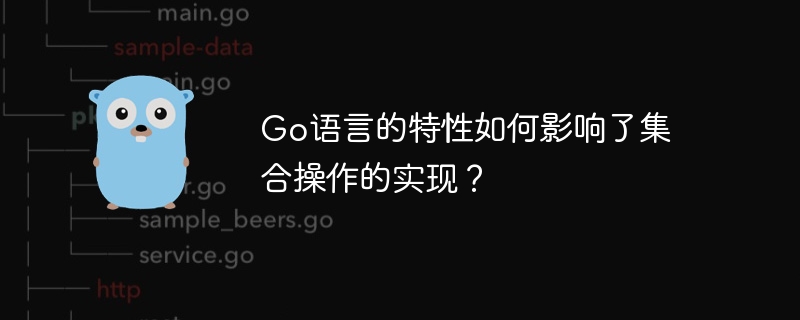Home >Backend Development >Golang >How do the features of the Go language affect the implementation of set operations?
How do the features of the Go language affect the implementation of set operations?
- PHPzOriginal
- 2024-03-23 12:15:03613browse

Go language, as a modern and efficient programming language, has many unique features, which have an important impact on the implementation of set operations. This article will explore how several key features of the Go language affect the implementation of collection operations, and demonstrate these effects through code examples.
Concurrent programming
The Go language inherently supports concurrent programming. Concurrency control can be easily achieved through goroutine and channel, which provides a more efficient implementation method for collection operations. For example, goroutine can be used to process elements in a collection concurrently to speed up processing while avoiding blocking in regular loops.
package main
import (
"fmt"
)
func main() {
data := []int{1, 2, 3, 4, 5}
result := make(chan int)
for _, value := range data {
go func(v int) {
result <- v * v
}(value)
}
for i := 0; i < len(data); i++ {
fmt.Println(<-result)
}
}The above code shows how to use goroutine to concurrently perform a square operation on a set of integers and output the result. Such concurrent processing greatly improves the efficiency of the program.
Functional programming
The Go language supports some features of functional programming, such as higher-order functions, closures, etc., which makes collection operations more flexible and concise. The idea of functional programming can make the code more readable and easier to maintain and debug.
package main
import (
"fmt"
)
func mapInts(data []int, f func(int) int) []int {
result := make([]int, len(data))
for i, v := range data {
result[i] = f(v)
}
return result
}
func main() {
data := []int{1, 2, 3, 4, 5}
squared := mapInts(data, func(x int) int { return x * x })
fmt.Println(squared)
}In the above code, we define a mapInts function that accepts a collection of integers and a function as parameters, applies the function to each element in the collection and returns a new gather. This functional programming style makes collection operations simpler and easier to understand.
Built-in container types
The Go language provides a rich set of built-in container types, such as slice, map, etc. These container types provide very convenient support for collection operations. Through these container types, we can quickly add, delete, modify, and query collections, which greatly simplifies the implementation of collection operations.
package main
import (
"fmt"
)
func main() {
// 使用slice
slice := []int{1, 2, 3, 4, 5}
slice = append(slice, 6)
fmt.Println(slice)
// 使用map
m := make(map[string]int)
m["apple"] = 5
m["banana"] = 3
fmt.Println(m)
}In the above code, we show how to use the two built-in container types of slice and map to perform collection operations, such as adding elements to slice and assigning values to map.
In general, several major features of the Go language, including concurrent programming, functional programming and built-in container types, all have an important impact on the implementation of collection operations. Through these features, we can operate collections more efficiently and write more expressive and maintainable code. If you are a fan of the Go language, hurry up and try to use these features to implement your own set operations!
The above is the detailed content of How do the features of the Go language affect the implementation of set operations?. For more information, please follow other related articles on the PHP Chinese website!

